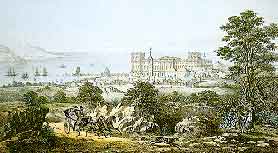
|
|
|
| History of Portuguese Literature | Origins of Portuguese Literature | The Portuguese Language | Oral Literature | Fiction | Lyricism |
| Travel Literature | Cantigas de amigo | Historiography | Doctrinal Prose | ||
| Baroque and Mannerism | Classics | Existentialism | Experimentalism | Enlightenment | Modernity |
| Neo-Realism | Post-Modernism | Realism | Romanticism | Saudosismo | Symbolism |
Romanticism
|
|
Romanticism
was officially introduced into Portugal with the poem Camões,
by Almeida Garrett, its great figures being this
author, Alexandre Herculano
and Camilo
Castelo Branco, although the
latter belonged to a later generation that overlapped with the advent of the
realist school.
 The Royal Palace on the hillside of Ajuda |
The
introduction of the discourse of history as a science (Herculano), the renewal of the theatre (Garrett)
and the creation of the historical novel (involving not only both these
writers, but also a long line of authors that continued into the twentieth
century) are some of the contributions of the Romantic school, which is
characterised by the great attention given to individual expression,
particularly at the level of the emotions and confessionalism, and the defence
of the values of freedom (from the political to the literary level, especially
in relation to poetry) and a person’s origins (infancy, nationality, tradition,
as well as human nature in its fight against the corrupting influence of society).
© Instituto Camões, 2001